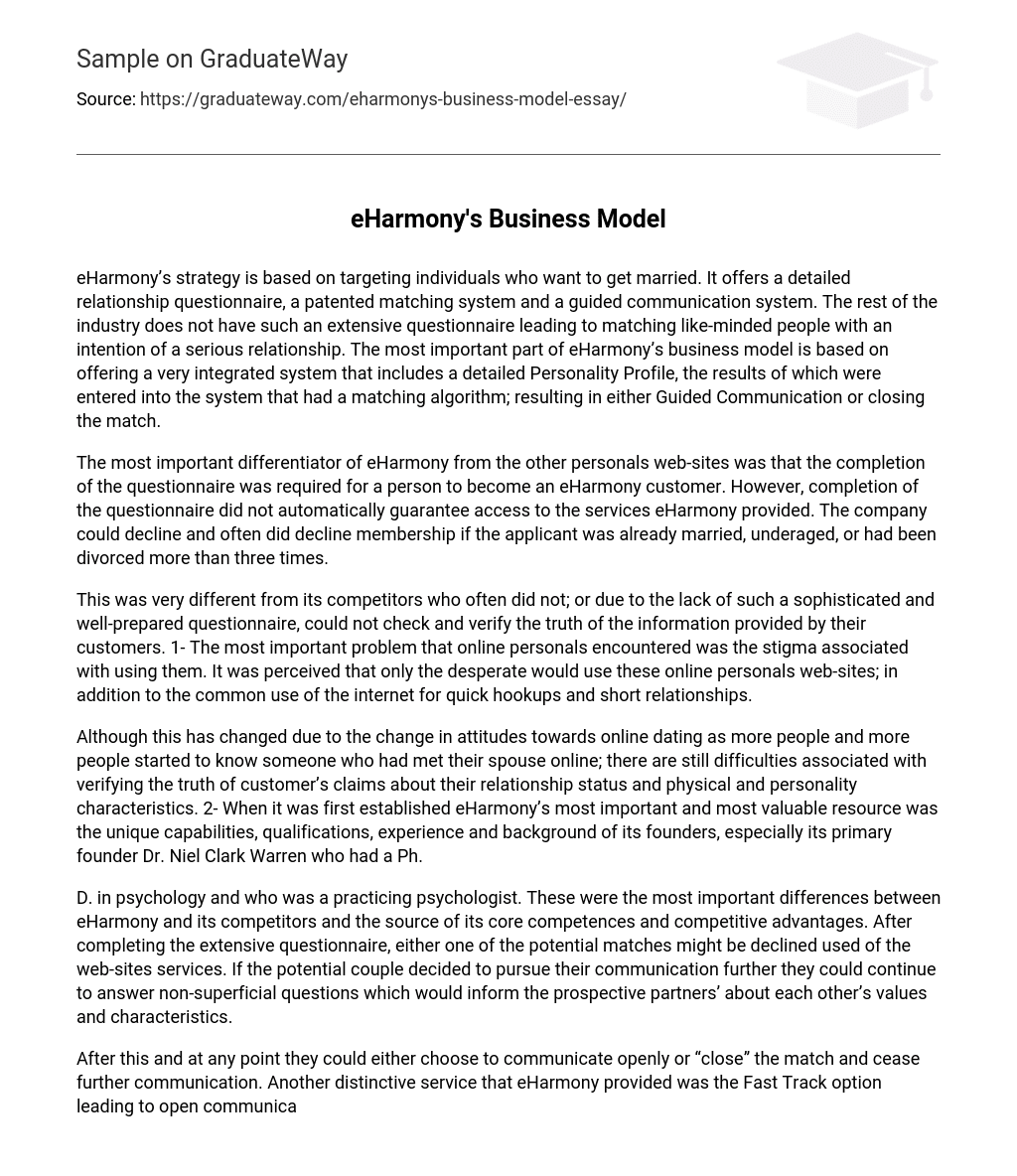eHarmony’s strategy is based on targeting individuals who want to get married. It offers a detailed relationship questionnaire, a patented matching system and a guided communication system. The rest of the industry does not have such an extensive questionnaire leading to matching like-minded people with an intention of a serious relationship. The most important part of eHarmony’s business model is based on offering a very integrated system that includes a detailed Personality Profile, the results of which were entered into the system that had a matching algorithm; resulting in either Guided Communication or closing the match.
The most important differentiator of eHarmony from the other personals web-sites was that the completion of the questionnaire was required for a person to become an eHarmony customer. However, completion of the questionnaire did not automatically guarantee access to the services eHarmony provided. The company could decline and often did decline membership if the applicant was already married, underaged, or had been divorced more than three times.
This was very different from its competitors who often did not; or due to the lack of such a sophisticated and well-prepared questionnaire, could not check and verify the truth of the information provided by their customers. 1- The most important problem that online personals encountered was the stigma associated with using them. It was perceived that only the desperate would use these online personals web-sites; in addition to the common use of the internet for quick hookups and short relationships.
Although this has changed due to the change in attitudes towards online dating as more people and more people started to know someone who had met their spouse online; there are still difficulties associated with verifying the truth of customer’s claims about their relationship status and physical and personality characteristics. 2- When it was first established eHarmony’s most important and most valuable resource was the unique capabilities, qualifications, experience and background of its founders, especially its primary founder Dr. Niel Clark Warren who had a Ph.
D. in psychology and who was a practicing psychologist. These were the most important differences between eHarmony and its competitors and the source of its core competences and competitive advantages. After completing the extensive questionnaire, either one of the potential matches might be declined used of the web-sites services. If the potential couple decided to pursue their communication further they could continue to answer non-superficial questions which would inform the prospective partners’ about each other’s values and characteristics.
After this and at any point they could either choose to communicate openly or “close” the match and cease further communication. Another distinctive service that eHarmony provided was the Fast Track option leading to open communication. Couples could mutually agree to use this method instead of the more lengthy and complicated Guided Communication method. 3- The sources of eHarmony’s competitive advantage may be easily transferred to the Turkish context since marriage is still a very important institution in Turkey.
In addition, verification of personal information about any person is relatively easy in Turkey due to the fact that most information about a person’s personal attributes such as age and gender and relationship status; such as whether that person is married, divorced or widowed is on a central government data base. 4- eHarmony faces challenges arising from competing online paid or free personals (do-it-yourself or not) web-sites, off-line personals companies including niche sites addressing special “community of interest sites” and online social networks such as MySpace or Facebook.
All these competitors create challenges for eHarmony. In order to keep up its reputation as a relationship builder eHarmony can use its matching algorithm and modify it for more casual/medium-term relationships, aim at various other overlooked segments, or growing new businesses based on eHarmony’s own research and development efforts that involve life stage transitions such as weddings, pregnancy-fertility, parenting and elder care. Harmony could also establish business in other countries, especially starting with English speaking countries and continue with other EU member countries where online dating is already popular. Online dating companies are also very popular in Asian countries; however, eHarmony would have to take into account the variety and nuances of differing relationship values in these countries.





